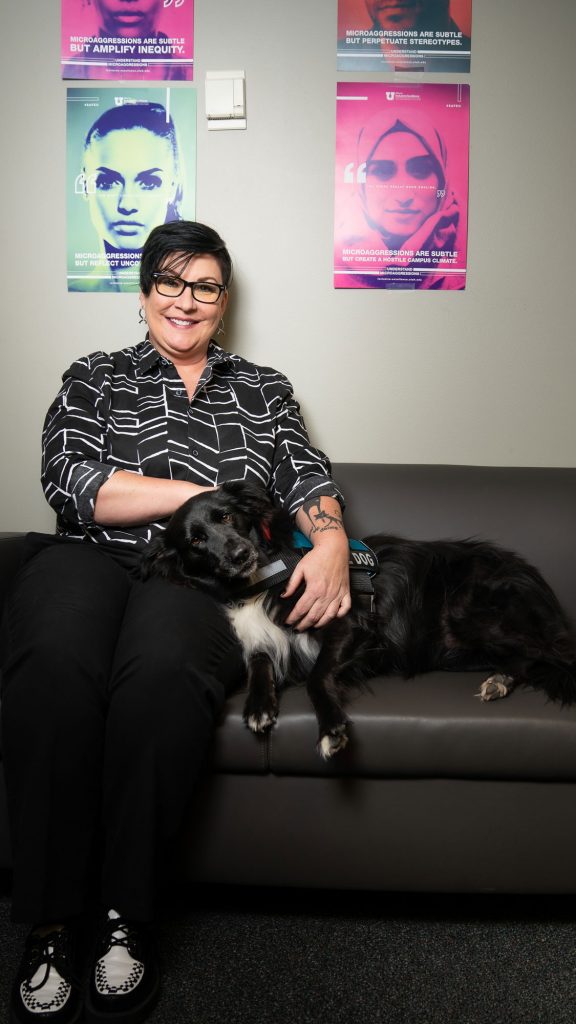The new director of the Office for Inclusive Excellence is deeply committed to helping make the University of Utah climate the best it can be. Jude McNeil holds two degrees from the U—a bachelor’s in mass communications and a master’s in social work. As an undergraduate student, they interned at the LGBT Resource Center, and eventually took a full-time position as the assistant director of the Office for Inclusive Excellence in July 2017.
“Before attending the U as an adult, I attended classes with my mom as a child,” said McNeil. “I’ve always been invested in this institution and I’m under no illusion that I can change the entire world, but I can do my part on this campus to help students succeed.”

Jude McNeil with their support dog Pierre.
Download Full-Res ImageWhile education has always been incredibly important to McNeil, it wasn’t always accessible to them. As a teenager in Salt Lake City, they experienced homelessness as a queer youth for nearly three years. Despite loving school and desperately wanting to finish, they dropped out during their freshman year.
“It just wasn’t possible to not sleep the night before and have nowhere to go and consider going to school in the morning,” said McNeil. “On top of that, because I was homeless, I was labeled a bad kid and so that’s how I was treated by the adults that were working with youth in that high school.”
McNeil said there were plenty of adults around them that had opportunities to help but didn’t. In fact, some of them only made it worse by not understanding McNeil’s perspective and experiences as well as their own bias. These experiences continue to fuel McNeil’s passion for teaching others how to look at their own bias and recognize how it might be negatively impacting their work.
“We know implicit bias has a significant impact on campus climate,” said McNeil. “There is often a lack of skills and understanding of how to communicate effectively across differences.”
McNeil hopes to change that through their work at the Office for Inclusive Excellence. Students, staff and faculty can report incidents of bias to them and they follow up with the reporter to see what they would like to see happen. If desired, McNeil and their staff can provide professional development for the department, college or office where the incident occurred.
The Office for Inclusive Excellence has three primary focuses:
- Bias incident reporting system
- Intercultural development
- Climate assessment
Anyone who witnesses or experiences a bias incident within the U community can report it either anonymously or using their name. McNeil said many of these incidents take place in classrooms and faculty members don’t know how to address them.
“We take what we’re learning from the bias incident reporting system and use it to inform our intercultural professional development program,” said McNeil. “It includes workshops and an online assessment that measures cultural competency along a continuum. It then creates a development plan based on wherever an individual may be, and they can take it again the next year to measure the change.”
Finally, the office initiates climate assessments with various colleges and schools on campus. They compile reports on what types of bias incidents people are experiencing and produce recommendations on how to enhance that department’s climate. All of these efforts are intended to improve communication across differences on campus.
“According to a Workforce 2020 survey by SuccessFactors, diversity is ranked as the number four top employee attribute,” said McNeil. “In order to be competitive in today’s job market, candidates need to have intercultural skills. As an institution, we need to make sure that our staff and faculty know how to provide these skills for our students. Providing these skills for students, staff and faculty will also benefit our campus climate and create a braver space where people can have healthy dialogues.”
Anyone interested in scheduling a training with the Office for Inclusive Excellence can contact Ella Blanchard at GBlanchard@sa.utah.edu.
